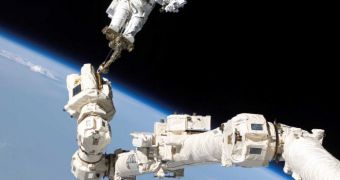When traveling in space, astronauts are known to be at a higher risk of getting sick. This happens for a wide variety of reasons, ranging from the fact that they never get enough sleep to the size of their quarters, the effects of weightlessness, and the stress associated with their high-risk jobs, and with being away from everyone they know. Now, a new study adds an additional factor to this equation. A team of scientists has determined that being exposed to microgravity affects a number of genes associated with controlling the functions of the immune system, ScienceDaily reports.
In addition, several genes that are in charge of regulating the human body's response to stress were found to have their function changed as well. According to the research team, which is based at the University of Arizona, it may be that these changes the body experiences – combined with all the aforementioned factors – contribute to rendering astronauts more vulnerable to various afflictions. This represents all the more reason for space mission planners and managers to ensure the cleanest environment possible for people heading to the International Space Station (ISS), or on the shuttles.
“Taken together, our results hint at the possibility that an astronaut's immune system might be compromised in space,” explains the leader of the investigation, UA College of Medicine Department of Immunobiology expert Ty Lebsack. He reveals that the study places a new obstacle in the path of long-distance space travel, such as journeys planned for Mars and near-Earth objects (NEO). Oddly enough, it's human limitations that prevent us from going to the Red Planet, and not technological ones. “Many of the genes whose activity was down-regulated in the space-flown mice play important roles in maintaining that balance. Potentially, you could get more cell death aboard a spacecraft because of these differences,” Lebsack explains.
“Previous studies with cell cultures in clinostats showed increased cell death in T-cells when you take away the gravity stimulus, so it was a logical step to test whether we find the same effects in animals exposed to an actual lack of gravity. We observed an overall pattern about the genes whose expression was changed by space flight: All of them are involved, in one way or another, in the development, control and programmed cell death of immune cells,” he adds. The study was based on samples of thymus tissues, collected from four mice that flew to the ISS on Endeavor, during the STS-118 mission.

 14 DAY TRIAL //
14 DAY TRIAL //